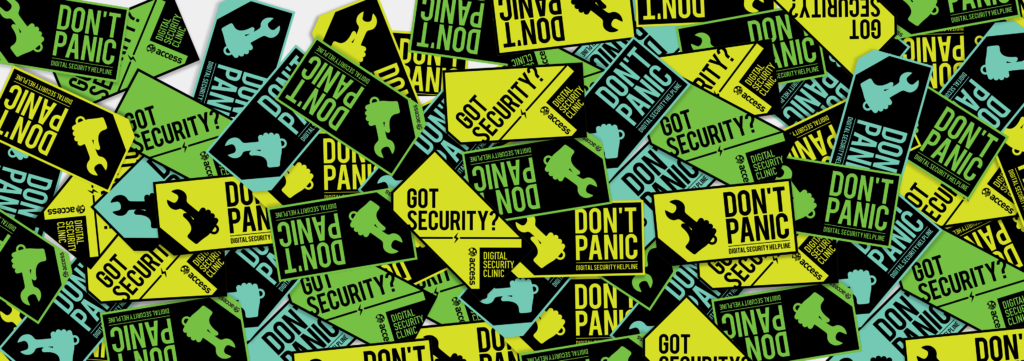
Following is a close look at one of the cases we have handled through the Digital Security Helpline. For additional context, see our post, Defending users at risk from DDoS attacks: An evolving challenge.
Summary
In Sudan, the government heavily restricts the exercise of freedom of expression, online and off. In some areas, bloggers and journalists have been harassed, persecuted, imprisoned, or even killed for expressing their views.
During the 2015 general elections in Sudan, several online newspapers were targeted for malicious hacking and Distributed Denial of Service (DDoS) attacks. When one opposition newspaper became unreachable due to a suspected DDoS attack, Dalia Haj-Omar, a Sudanese human rights advocate living in France, enlisted the help of Access’ Digital Security Helpline, through which activists, independent media, and civil society organizations across the globe can get real-time, direct technical assistance and advice 24 hours a day, seven days a week. With our assistance, the opposition paper was accessible again within 48 hours. (Please see our note below on U.S. sanctions and our work in Sudan.)
Haj-Omar has a deep background in digital rights, and was co-author of the Sudan chapter of Freedom House’s Freedom on the Net report for 2013 and 2014. Currently, she focuses on human rights, peace-building, and conflict resolution. She also designs trainings on strategic digital advocacy and citizen journalism.
Crisis: Opposition media under attack
One evening on a weekend during the 2015 elections, Haj-Omar received an email from a contact at a small, reputable opposition newspaper, seeking her assistance.
“The paper suffered a DDoS attack, but it had taken them five days to find out it was a DDoS attack. They saw that it was happening, but they didn’t have the resources to figure out what it was or what to do,” explains Haj-Omar.
Some newspapers struggle to fend off these kinds of attacks because they have only one person on the team who fully understands the technology, and in some cases, “the whole organization is run by volunteers,” says Haj-Omar.
Even people who have had previous digital security training can struggle, she says. It happens when they’re using complex technology, they’re in need of urgent help, or “they’re in a very stressful situation.”
“That’s when you need people who are willing to help right away, to follow up, and to go beyond the basics.”
After learning about the DDoS attack, Haj-Omar — who was introduced to Access in 2009, during the national protests in Sudan — reached out to our Digital Security Helpline, which has offices in Costa Rica, Tunis, and Manila. “The organization has been great in terms of general support,” she says. “I actually got to meet the Digital Security Helpline staff at RightsCon 2014 and IGF 2014 in Istanbul, personally. So now they know me, and I know them, face to face.”
Haj-Omar frequently refers people to the helpline, making “at least three or four referrals since the beginning of 2015 through April, from two different countries.”
“I had known about the Deflect project, which supports people specifically when they are fighting off DDoS attacks. I knew that the newspaper needed to be referred to Deflect to be considered legitimate. So naturally I thought Access would be a good referral,” says Haj-Omar.
“It was the weekend, so I thought, ‘Okay, this will take a few days.’ But the response was instant,” she says. “The Costa Rica office was right there. They shared a link to request a download for the Deflect software, and the process got started right away.”
Resolution: Newspaper up and running in 48 hours
Haj-Omar sent an email introducing the people at Access to the tech person at the newspaper, and was able to monitor the situation through resolution. “I was kept cc’d and they managed to fix the problem in a maximum of 48 hours,” she says.
According to Haj-Omar, what made the process quick and easy was the flexibility of the helpline staff, their ability to offer more than only basic information, and their persistence with follow-through.
“I’m part of a civil society that is not very tech savvy, let alone in a secure way. This direct technical assistance is very important,” she explains. “The helpline staff are very flexible. That’s especially helpful if you need to go to the next level in fixing a problem, beyond the basics of setting up end-to-end encrypted email.”
“We need to educate people, and tell them that there are organizations out there that give this kind of support, not just access to the basic tools. Yes, you can figure out how to browse anonymously, etc. But also, once you have a real problem, a real emergency situation, there’s another level beyond, ‘Here’s a tool that you can use.’ Sometimes that level gets neglected.”
In addition, says Haj-Omar, the staff is friendly and approachable.
“The perception is that tech geeks are not approachable — your team made me challenge that stereotype,” says Haj-Omar.
“The human side of this is so important, because it’s about trust,” she explains. “That human aspect is something that isn’t easily explained or transferred when you read a description of an organization. For me, it is a big deal. It makes me want to use the helpline without hesitation.”
Note about U.S. sanctions
Sudan has been placed under sanctions by the U.S. for certain transactions; however, we believe our work through the helpline complies because it supports the free flow of information online and facilitates personal communications by Sudanese.
